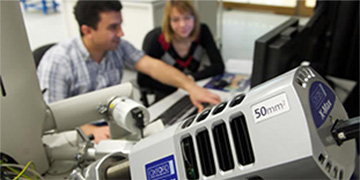
Research data management & sharingData storage
Storing research data at Strathclyde
- Centrally-managed storage
- OneDrive for Business
- Teams
- SharePoint
- Strathcloud
- Network drives
- Storage option comparison
- Limited access accounts for external collaborators
- Encryption
- Information security
- IT helpdesk
For a personalised file storage recommendation, please complete the File Storage Selector tool on the Information Services website.

Data storage & research data management
In order to ensure that data can be stored and reused in the long term, researchers should distinguish between active research data and completed research data, and should have distinct storage methods for each.
Active research data is data that is currently being used, or is planned to be used in the near future.
Completed research data is data that needs to be preserved in a particular state, as it is deemed to be valuable and worth retaining for reuse or to authenticate findings.
OneDrive, Network Drives, SharePoint, Teams, and some departmental storage systems are appropriate for storing active research data, but they are not appropriate for storing completed research data. Completed research data should be stored in a data repository, where it will be professionally curated in the long-term. At the University of Strathclyde, research data, which are complete, and are no longer being worked on, can be deposited in Pure.
Moreover, data (files) held in storage linked to an individual's DS login will be deleted when the person leaves the University. By depositing data into Pure, as a dataset, the data creator ensures that the data can be preserved and made publicly findable and accessible for a minimum period of 10 years. Furthermore, the deposit of data in Pure (or another suitable data repository) provides a timestamp and a means for data to be cited and reused in the future.

Data security
Researchers should avoid:
- External hard drives & USB sticks
- 3rd party cloud storage
- Local storage that is not backed up
If any of these storage methods are unavoidable, researchers should use encryption to protect against unauthorised access to data. This is in line with the University's encryption policy.
Researchers should think carefully about their research processes, and consider what steps should be taken, beyond simply using a secure system for storing data at rest, to ensure data is stored and transferred securely throughout the research project. This might involve:
- Using OneDrive for Business to send data to University storage when working off-campus
- Using OneDrive for Business to send and receive data to/from external collaborators or participants
- Using encrypted external hard drives to back up data when no internet access is available
- Choosing appropriate data collection locations to ensure sensitive data can be collected without breaching confidentiality
- Anonymising data, or pseudo-anonymising data and storing the key code in a separate location to the data
- Ensuring physical data is stored in secure locations and digitised where appropriate